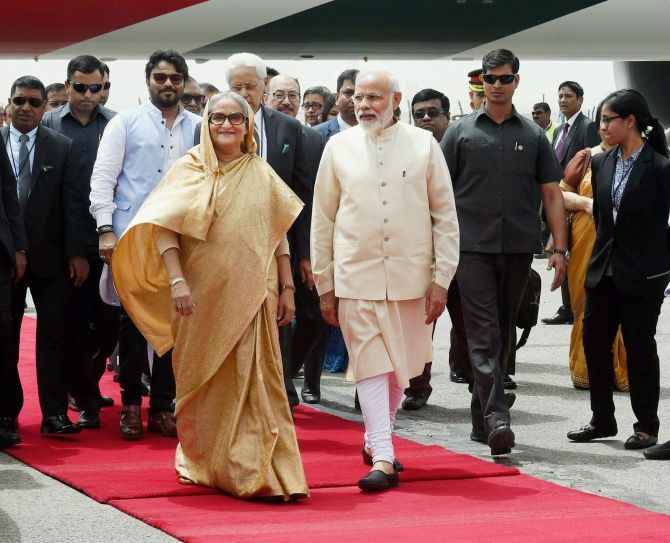It's something to remember as New Delhi welcomes Sheikh Hasina, says Sunanda K Datta-Ray.

India is understandably excited at the prospect of welcoming Sheikh Hasina Wazed. But it would be wise not to forget that China has always been the elephant in the room of India-Bangladesh relations, especially where rivers are concerned.
I remember the pride with which H M Ershad, who was then Bangladeshi president, told me in 1985 in his modest Dhaka cantonment bungalow that he had obtained what the 'India Lobby' -- meaning Sheikh Hasina and her Awami League -- had failed to do.
Rajiv Gandhi had promised him to include Nepal in future riparian talks. Everyone knows it didn't happen.
What may be less well known is the contempt with which a senior external affairs ministry official with special links to Bangladesh and its president spoke of the prime minister for making such a reckless commitment.
"We had to work very hard to get out of it!" he said. Rajiv Gandhi didn't realise, he added, dismissing the prime minister in derogatory terms, that once you had Nepal, it would be impossible to exclude China.
If bilateral talks became quadrilateral, the other three would gang up against India.
Perhaps, this was a relic of the classic Indira Gandhi persecution complex.
But if Sheikh Hasina does want China included in talks on the Teesta and Brahmaputra rivers, and Narendra Modi acquiesces, I wonder if any of today's foreign service diplomats would be able to block it.
The possibility of such a request can't be ruled out after the Bangladesh prime minister's political advisor, H T Imam, told a Kolkata journalist, Devadeep Purohit, that in view of Indian reports of China building barrages in Tibet and diverting the waters of these two rivers, it 'should also be brought into the picture.'
Of course, Imam quickly added this was his 'personal opinion.' But we know that except perhaps right at the beginning when Sheikh Hasina's father, Mujibur Rahman, as innocent as he was overwhelmed with gratitude, signed a water treaty with Mrs Gandhi, Dhaka has always wanted a third party.
A Bangladeshi diplomat in Kolkata once gave me his explanation of India's refusal to involve even dependent Nepal. It had nothing to do with China, he said.
The obstacle was diplomatic duplicity.
"You see," he said, "an upper riparian country has one set of rights. A lower riparian country has another. India takes the latter position with Nepal, but the former when dealing with Bangladesh. Now, if Bangladesh and Nepal are both at the same table, would India speak as an upper or lower riparian country?" The two positions are not always reconcilable.
Common sense does seem to favour consultation among all parties concerned. Nature locks destinies regardless of politics.
Once during those difficult negotiations over the Farakka barrage, the Bangladesh side tabled an article I had written on illegal drawings in Uttar Pradesh that had reduced the water level in the lower Ganga.
Mamata Banerjee complains that the Teesta's flow would have been much more robust had it not been for dozens of hydroelectric projects throughout Sikkim.
Rivers know no borders; geography is beyond politics.
All this argues for uninhibited discussions among Bangladesh, India, Nepal and China/Tibet. Or it would have if every participant could be relied on to be absolutely frank.
India can't conceal facts about actual flows to deprive Bangladesh.
China can't be secretive about dams and barrages in Tibet that divert water from the Teesta and Brahmaputra.
Multilateral talks are necessary, but can help only if all facts regarding river works and flows are ascertainable through third party inspection.
Before asking for expanded talks, Bangladesh should persuade China to agree to that.
India can never hope to match China's $38.05 billion investment in Bangladesh.
Sheikh Hasina's logic that Chinese help will increase Bangladeshi purchasing power and that 'India is best poised to benefit from the Bangladeshi market' smacks too much of sophistry to offer comfort.
But yes, her Bangladesh is India's second best friend in the neighbourhood. It isn't the first: That honour goes to small, landlocked and vulnerable Bhutan, which has for years resisted Chinese urgings to sign a border agreement and exchange ambassadors.
It's something to remember as New Delhi welcomes Sheikh Hasina.












 © 2025
© 2025